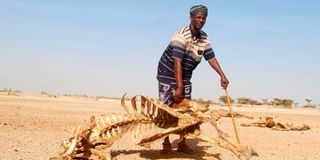How ethics can help us to tackle environmental crisis

A herder holds a dried-out carcass in Horri Guda, North Horr, Marsabit County. Pastoralists in nothern Kenya are losing their herds to the devastating drought.
What you need to know:
- Environmental ethics is the expectation that human beings can redefine their relationship with ecology.
- Such a relationship would expect the individual to appreciate and respect their surroundings.
Rivers have dried up. Forests have disappeared. Animals are dying for lack of fodder and water. Drought stalks land all over the globe. Fires are displacing even town dwellers because rain is not falling and the land is dry. There is starvation and death in this land, and in many parts of Africa, because nature is struggling to renew and sustain itself and support humanity.
Scientists have been urging humankind to watch out on its destructive ways or pay with life for not taking care of mother earth. Governments all over the world commit themselves to protect the environment but their words do not match their actions.
What can be done? What should be done? Can humanity afford the endless talk shops on the environment that happen every year all over the world? Or should people sit down, wherever they are in the world, and ponder their relationship to the environment; ask themselves what nature gives them; what they can do to manage, renew and sustain it; and how to guarantee their progeny and an environmentally safe and sustainable world? This is one of the suggestions that environmental scholars have made in the past and which Richard Rwiza highlights in his book, Environmental Ethics in the African Context (Catholic University of Eastern Africa Press, 2021).
Environmental ethics is not some esoteric philosophical musing. It is, in a simplified sense, the expectation that human beings can redefine their relationship with the ecology. Such a relationship would expect the individual, from the child to the aged, to appreciate and respect their surroundings. Each person would have to value the flora and fauna around them. Thus, a child should be taught why the world is the way it is. They should know what animals and plants exist in their community; why they exist; how they affect each other and human beings; and how to live with them. This knowledge should increase as the child grows into an adult.
Rwiza shows that there is enough evidence to show that Africans, from time immemorial, understood the link between humans and ecology. The world of plants and animals was in most cases directly connected to the wellbeing of people. Plants provided food, medicine, equipment, material for building, furniture etc. Animals may have come into conflict with humans some time but they were a source of food; they helped in regeneration of plant life by spreading seeds; they provided hides for clothing, and in some cases, such as dogs, cats, horses etc, they were friends to human beings.
But more important, as Rwiza shows, African societies saw a spiritual link between humans and the environment. For instance, when a child was born, its umbilical cord was buried. The place of burial – the home – symbolically connected the person to the spirit world of those who had died before and were buried on the same land. Thus, the homestead needed to be cared for, especially the plant life that surrounded burial grounds and the homestead itself. Which is why some trees in some homes would not be cut. Such trees were seen as sacred, connecting the living to the dead but also providing utility for the living.
Environmental ethics would demand individual and collective responsibility rooted in local knowledge and cultures. It doesn’t take much research to know that all African cultures have proverbs and stories that transmit(ted) knowledge about the environment; and that such gen is still available in local stories. The moral lessons of such stories, proverbs, songs etc was and is always about restoring human-wildlife equilibrium.
The story of the hare and the tortoise or the ogre and human beings were not just told to children as entertainment or education. They were meant to pass on knowledge about the behavior of the animals in the story, their habits, their value to human beings and their place in the world – of humans and animals. Therefore, children would learn about how to understand and care for ecology, which was a form of early lessons in environmental ethics.
What humans have to do is to be responsible for their lives now, and for the lives of those to come. Communities should strive to understand what history and traditions teach them about care for the environment. They should then work hard to transmit that knowledge to their young ones, both in theory and practice.
Young people need to be told that air conditioning and refrigeration technology have environmental consequences; and that trees and plants and better architectural designs of buildings can be environmentally sustainable substitutes. Greening the environment is more affordable and useful to humanity in the long run than simply seeking technological solutions.
Environmental care is a holistic effort. It is about identifying and dealing with habits and activities that may harm the ecology. How do we dispose of waste from our homes; should we encourage public as opposed to private transport; what is the most effective way of using water; what does one do with an unused phone or pair of plastic shoes; how many clothes should one person have; how much food should one eat in a day etc.
These questions are personal but also communal. They are local and global. They are theoretical and practical. They are political, cultural, social, economic and spiritual in nature. They raise fundamental ethical problems for the environment, for as Rwiza suggests in Environmental Ethics in the African Context, they are “a matter of human survival as well as the existence of other creatures.” The search for a solution to the imminent environmental disaster should be approached in an integrated manner that acknowledges and celebrates the place and value of all ecological elements on earth.
The writer teaches literature and performing arts at the University of Nairobi. [email protected]





